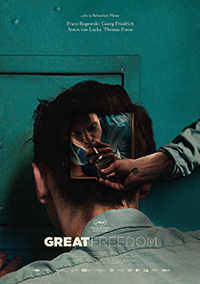Laws of Attraction: Rogowski Shines Bright in Recuperative Queer Prison Drama
 Although there’s nary an upside down pink triangle in sight, Austria’s Sebastian Meise cultivates a trajectory of virulent, state sanctioned homophobia in his sophomore feature Great Freedom. Filtered through the lifespan of one particular German man surviving the concentration camps of WWII to the country’s large-scale social reformations of the late 1960s, Meise embraces a certain fetishized mise en scene for this nonlinear odyssey of prison cell vignettes. If at times the storytelling functions as a way to negate itself, restricted to the confines of the prison as if to metaphorically suggest restraint crystallizes itself into meaningful experience, Franz Rogowski consistently elevates this somber procedure with empathetic aplomb. Prizing emotionality over sensationalism, Meise also avoids a real sense of catharsis in this portrait of a man whose life is hobbled and defined by the hatred of others.
Although there’s nary an upside down pink triangle in sight, Austria’s Sebastian Meise cultivates a trajectory of virulent, state sanctioned homophobia in his sophomore feature Great Freedom. Filtered through the lifespan of one particular German man surviving the concentration camps of WWII to the country’s large-scale social reformations of the late 1960s, Meise embraces a certain fetishized mise en scene for this nonlinear odyssey of prison cell vignettes. If at times the storytelling functions as a way to negate itself, restricted to the confines of the prison as if to metaphorically suggest restraint crystallizes itself into meaningful experience, Franz Rogowski consistently elevates this somber procedure with empathetic aplomb. Prizing emotionality over sensationalism, Meise also avoids a real sense of catharsis in this portrait of a man whose life is hobbled and defined by the hatred of others.
Hans Hoffman (Rogowski) finds himself arrested for violating Paragraph 175, which clearly outlines the illegality of homosexuality, heavily implemented during Nazi era Germany. When Germany is liberated by the Allied Forces, rather than being released, Hans is brought from the camps to a prison cell to serve the remainder of his sentence. While in prison, he has an initial contentious relationship with his cellmate, Viktor (Georg Friedrich), who despises having to share space with a gay man. Eventually, Viktor sympathizes with Hans and what he’s gone through. Though Hans is released, he finds himself arrested for the same crimes again and again, each time brought back to Viktor, a man who also sabotages his potential freedom during a parole hearing. Then, in 1969, Paragraph 175 was modified, allowing for Hans’ release. But the brand new liberated world he finds himself occupying doesn’t feel any more inviting.
There are certainly other films dealing specifically with the Nazis round-up of homosexuals and their subsequent experiences in concentration camps, from Bent (1997) to the French television melodrama A Love to Hide (2005), among others. Likewise, the 2000 Rob Epstein-Jeffrey Friedman documentary Paragraph 175 gives an explicit history of the particular section of the German Penal Code created in 1871, which deemed homosexuality illegal, modified in 1935 by the Nazis and received several softening of its definitions until it was completely repealed in 1994. But Meise isn’t really interested in a history lesson trajectory, eventually finding power in the briefest bits of intimacy and suggested eroticism.
Though hardly the full-blown titillation of soft-core prison porn motifs from Bruce La Bruce, there’s a certain parallel to Jean Genet’s 1950 short film Un Chant D’Amour which Meise seems to be channeling. Grounding the film is an impressive, eloquent performance from Rogowski, who also undergoes a striking physical transformation. There’s a profundity in his character’s ability to evolve despite significant heartbreak and cruelty.
Although experiencing severely constrained romantic interactions, which tend to cause more pain than happiness (particularly with the suicidal Oskar, played by Thomas Prenn), the crux, or salvation rather, is Hans relationship with Friedrich’s Viktor, a drug addict with his own significant hang-ups. Friedich isn’t allowed the same range of magnetism as Rogowski, and while there’s a certain amount of love and respect, Meise and co-writer Thomas Reider never establish these feelings as running deeper than superficial propinquity. But maybe this is also the ultimate point of Great Freedom, the name of gay bar in the film’s denouement meant to showcase the irony of Hans’ experience, imprisoned so long he’s like a tied baby elephant who doesn’t realize his strength or capability as an adult.
Shot by Crystal Fournier (no stranger to the portraiture of troubled souls, such as her beautiful work on Nico, 1988, or the hopeful focus of Celina Sciama’s Girlhood), this is a film of drabness and darkness, the only light moments provided through footage of Hans outside the prison. While Meise isn’t necessarily interested in miserabilism, Great Freedom showcases the trials and travails of a generation of gay men who were irreparably doomed should they dare to be caught or reveal their true nature. In the end, for Hans, his depressing choice could also be read as a triumph by some since he’s returning to a place where nothing worse can happen than he’s already experienced.
★★★/☆☆☆☆☆


